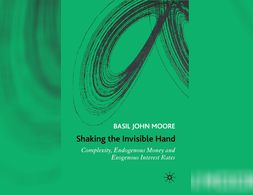✕
13 results
In a span of around 12 weeks, the course covers a wide range of topics including agent-based modeling, networks, dynamic, chaos, information, fractals, cooperation models and scaling in biology and society. The course acts as a perfect beginner level introduction spanning a wide range of topics in the field of complexity.
In this course you'll learn about the tools used by scientists to understand complex systems. The topics you'll learn about include dynamics, chaos, fractals, information theory, self-organization, agent-based modeling, and networks.
This text provides an easy to understand introduction to complexity economics for non-specialist audiences such as bachelor's students.
The objective of the course is to explore the main strengths and weaknesses of orthodox and heterodox paradigms within development economics.
The novel coronavirus (Covid-19) is rapidly spreading around the world. The real economy is simultaneously hit by a supply shock and a demand shock by the spread of coronavirus. Such a twin shock is a rare phenomenon in recent economic history.
Steve Keen analyses how mainstream economics fails when confronted with the covid-19-pandemic. Mainstream economics has propagated the dismantling of the state and the globalization of production - both of which make the crisis now so devastating. More fundamentally, mainstream economics deals with market systems, when what is needed to limit the virus’s spread is a command system.
From the two premises that (1) economies are complex systems and (2) the accumulation of knowledge about reality is desirable, I derive the conclusion that pluralism with regard to economic research programs is a more viable position to hold than monism. To substantiate this claim an epistemological framework of how scholars study their objects of inquiry and relate their models to reality is discussed. Furthermore, it is argued that given the current institutions of our scientific system, economics self-organizes towards a state of scientific unity. Since such a state is epistemologically inferior to a state of plurality, critical intervention is desirable.
This paper starts with an evaluation of three common arguments against pluralism in economics: (1) the claim that economics is already pluralist, (2) the argument that if there was the need for greater plurality, it would emerge on its own, and (3) the assertion that pluralism means ‘anything goes’ and is thus unscientific. Pluralist responses to all three arguments are summarized. The third argument is identified to relate to a greater challenge for pluralism: an epistemological trade-off between diversity and consensus that suggests moving from a discussion about ‘pros’ and ‘cons’ towards a discussion about the adequate degree of plurality. We instantiate the trade-off by showing how it originates from two main challenges: the need to derive adequate quality criteria for a pluralist economics, and the necessity to propose strategies that ensure the communication across different research programs. The paper concludes with some strategies to meet these challenges.
The workshop introduces into the field of critical political economy and tries to identify the role of finacial markets in capitalism, the reason for financial crises and the relevance of Marx in regard to these topics.
Complexity economics focuses on interactions and interdependencies between individuals and structures in economic systems. Those are systems of organised complexity. High importance is given to the analysis of networks.
This course focus on the behaviour of individuals from an pluralist economic and an interdisciplinary bevavioural science apprach.
This book makes the case that economies are complex systems and in response to this, develops a unique dynamic nonequilibrium process analysis of macroeconomics.
How Covid Shook the World s Economy Deftly weaving finance politics business and the global human experience into one tight narrative a tour de force account of 2020 the year that changed everything from the acclaimed author of Crashed The shocks of 2020 have been great and small disrupting the …
We use cookies on our website. Click on Accept to help us to make Exploring Economics constantly better!











